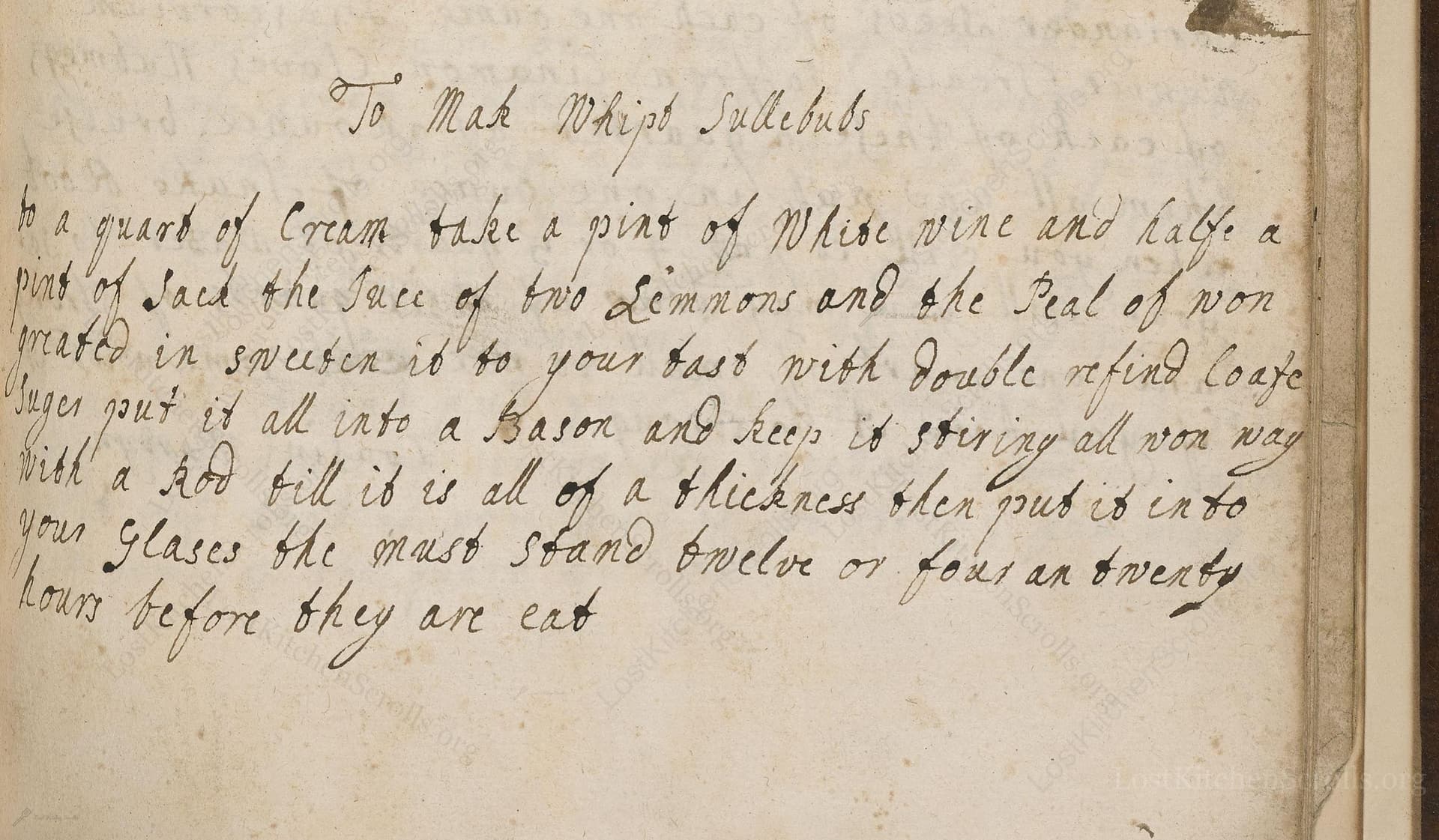To Make Whipt Sullebubs
From the treasured pages of Receipt book
Unknown Author

To Make Whipt Sullebubs
"to a quart of Cream take a pint of White wine and halfe a pint of Sack the Juce of two Lemmons and the Peal of won greated in sweeten it to your tast with Double refind Coarse Suger pout it all into a Bason and keep it stiring all won way with a Rod till it is all of a thickness then put it into your glases the must stand twelve or four an twenty hours before they are eat"
Note on the Original Text
This recipe is written in the style common to early eighteenth-century English cookery, where instructions are fluid and quantities are often given according to household measures rather than precise weights. Spellings like 'Sack' for sherry, 'Sullebubs' for syllabubs, and 'bason' for basin, as well as idiosyncratic punctuation and capitalization, were the norm before standardized English spelling. Directions such as 'keep it stiring all won way with a Rod' imply continuous, single-direction whisking to achieve the desirable aerated texture. The expectation that the directions are understood reflects a culture where oral tradition and practical experience filled in the blanks.

Title
Receipt book (1700)
You can also click the book image above to peruse the original tome
Writer
Unknown
Era
1700
Publisher
Unknown
Background
A delightful glimpse into the kitchens of the early 18th century, this historic culinary manuscript promises a feast of recipes, remedies, and perhaps a pinch of mystery. Expect both practical fare and elegant inspiration for the curious cook.
Kindly made available by
Folger Shakespeare Library
This recipe hails from around 1700, a period when English dining rooms delighted in frothy, wine-laced desserts known as syllabubs. Syllabubs were popular at festive tables, typically served in clear glasses to show off their splendid layers of curdled, boozy cream. Ingredients like sack (a type of fortified white wine, often sherry) and richly flavored lemons were symbols of luxury and international trade, reflecting the exuberance and curiosity of the early eighteenth-century English palate. The manuscript 'V.b.272' records household recipes and hints at the culinary skills of upper-class women who managed their kitchens with both flair and inventiveness. Syllabubs were as much a feast for the eyes as for the tongue, often awaiting the guests after hours of chilling.

The original cook would have used a wooden whisk or rod to briskly agitate the mixture. The cream and wines would be stirred energetically by hand in an earthenware or pewter basin. Graters, often made from tin or copper, were used to zest the lemon peel. The mixture was then poured into delicate glass syllabub cups or ale glasses, and left in a cool cellar or larder to set and thicken.
Prep Time
20 mins
Cook Time
0 mins
Servings
10
We've done our best to adapt this historical recipe for modern kitchens, but some details may still need refinement. We warmly welcome feedback from fellow cooks and culinary historians — your insights support the entire community!
Ingredients
- 1 quart double cream
- 1 pint dry white wine
- 1 cup sweet sherry (substitute for sack)
- Juice of 2 lemons
- Zest of 1 lemon (finely grated)
- 3/4 cup caster sugar (more or less to taste)
Instructions
- To make Whipt Syllabubs the modern way, begin by combining 1 quart of double cream with 1 pint of dry white wine and 1 cup of a sweet wine similar to sack, such as sherry.
- Squeeze in the juice of 2 lemons and finely grate the zest from 1 lemon.
- Sweeten the mixture to taste using about 3/4 cup of superfine (caster) sugar, but you may adjust this.
- Place all the ingredients in a large bowl and whisk vigorously in one direction until a thick, frothy consistency is achieved, like softly whipped cream.
- Spoon the mixture into glasses and let them stand in a cool place or the refrigerator for at least 12 up to 24 hours to allow the flavors to infuse and the froth to settle.
- Serve chilled.
Estimated Calories
460 per serving
Cooking Estimates
You can prepare Whipt Syllabubs in about 20 minutes by mixing and whisking all ingredients until thick and frothy. There is no cooking needed. Chill the glasses in the fridge for 12-24 hours before serving. Each serving has about 460 calories, and the recipe makes 10 servings.
As noted above, we have made our best effort to translate and adapt this historical recipe for modern kitchens, taking into account ingredients nowadays, cooking techniques, measurements, and so on. However, historical recipes often contain assumptions that require interpretation.
We'd love for anyone to help improve these adaptations. Community contributions are highly welcome. If you have suggestions, corrections, or cooking tips based on your experience with this recipe, please share them below.
Join the Discussion
Rate This Recipe
Dietary Preference
Culinary Technique

Den Bockfisch In Einer Fleisch Suppen Zu Kochen
This recipe hails from a German manuscript cookbook compiled in 1696, a time whe...

Die Grieß Nudlen Zumachen
This recipe comes from a rather mysterious manuscript cookbook, penned anonymous...

Ein Boudain
This recipe comes from an anonymous German-language manuscript cookbook from 169...

Ein Gesaltzen Citroni
This recipe, dating from 1696, comes from an extensive anonymous German cookbook...
Browse our complete collection of time-honored recipes



